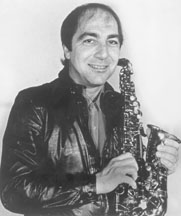
Alto Lines: Saxophonist Greg Abate's traditional brand of bebop doesn't truck with the postbop innovations of Coltrane and Coleman.
Ken Franckling
Noted alto saxophonist sticks up for the familiar strains of '40s'50s jazz
By Nicky Baxter
DON'T TALK to alto saxophonist Greg Abate about Ornette Coleman's theory of harmolodics, Sun Ra's extragalactic arkestrations or the Art Ensemble of Chicago's "black(s) into the future" free-blowing jazz; he's not having it. Abate is a confirmed bebop and swing man.
Perhaps even more strictly than the so-called young lions, Abate toes the bop lines first conceived by Charlie Parker, Thelonious Monk, Dizzy Gillespie and Miles Davis in the mid-1940s. Though one would be hard pressed to find signs of bebop's decline, Abate has nevertheless entered the race to save this species of music. Not for nothing is his new album titled Bop Lives!
Abate contends that bop "doesn't have an end. I feel like I can play a tune over and over, and it will still challenge me." It's ironic that just as the generation that preceded bop perceived it as just so much racket, so Abate disses postbop innovations. He is reminded of a remark made in the course of an interview last year: "I think if someone is playing notes, and it is not melodic, [the music] can sound disjointed."
Abate stands behind the comment, insisting that "playing 'sheets of sound' is not bop to me; I mean, it's okay, but I just don't dig it." Indeed, in Abate's view, "Playing a lot of notes and a lot of noise doesn't make it jazz." When it is mentioned that the phrase "sheets of sound" was coined to describe the playing of mid-period John Coltrane, the horn man appears slightly discombobulated.
Abate's background goes a long way toward explaining his pros and cons, musically speaking. His first instrument was clarinet; he switched to alto saxophone in high school, because the band director needed horn players. In time, he added tenor and soprano to his résumé.
During this period, altoist Paul Desmond, baritone saxist Gerry Mulligan and pianist Dave Brubeck--the "cool jazz" triumvirate--had dibs on the budding musician's ears; by the time Abate had entered Berklee's School of Music, Charlie Parker and Julian "Cannonball" Adderley's considerably hotter blowing had readjusted the youngster's thinking. He also cites alto players Sonny Stitt and Phil Woods as influences.
"What I like about Phil Woods," Abate explains, "is his accuracy. And the fact that, whatever tempo he's in, he swings. It's like he never takes chances." On the other hand, Stitt took lots of chances. "Sometimes, it worked, sometimes it didn't," comments Abate.
Though he could very well be considered a banner-waving bop purist, Abate did try his hand at fusion when it was popular. Abate claims that it was precisely this electronically enhanced musical style that sent him scrambling back to bop's sonicscapes. "The nervousness of [fusion] made it no fun for me. Fusion is more about making excitement than anything else; I had to get out of it. It didn't swing, it was contrived."
THIS PERIOD was followed by a more rewarding two-year stint with the storied Artie Shaw swing/big band. "Playing in that situation was good for me," Abate recalls. "It got me to play more accurately." Just as significant, the gig allowed him the opportunity to see how Parker and his compatriots shaped blue/black sounds from swing's relatively placid palette.
At least some of Abate's musical style can be seen as a distillation of swing's easygoing vibe and bop's more animated groove. Slide on any of Abate's solo efforts from 1993's Straight Ahead to Dr Jekyll & Mr Hyde, a collaborative effort featuring Richie Cole (a fellow Woods devotee) to Bop Lives!, and it's not hard to hear bop's swing-time roots.
On Bop Lives!, as on prior solo outings, sometimes Abate's swing-bop mix works (the title track and "Voyage"), sometimes it doesn't (Monk's "Ask Me Now"). "Bop Lives!" (an Abate original) recalls Parker's disciples more than the man himself. Don't get me wrong, Parker's sound is in evidence, but so is the influence of "cool" artist Art Pepper. This is not to suggest that Abate is merely a vessel through which flows the muse of others; by this point in his career, he has developed a unique voice.
Like Paul Desmond's, Abate's tone is well-behaved; not passive, exactly, but by no means as aggressive as, say, that of Adderley or Stitt or young guns like Kenny Garrett or James Carter. In any event, you can rest assured that the horn player will be bringing his impeccable taste and, yes, "accuracy," to town when he performs.
Greg Abate plays Sunday (Sept. 8) at 8:30 and 10pm at Garden City, 360 Saratoga Ave., San Jose. Tickets are $5. (408/244-7251)
[ Metro | Metroactive Central | Archives ]
![[Metroactive Music]](/music/gifs/ma-music.gif)